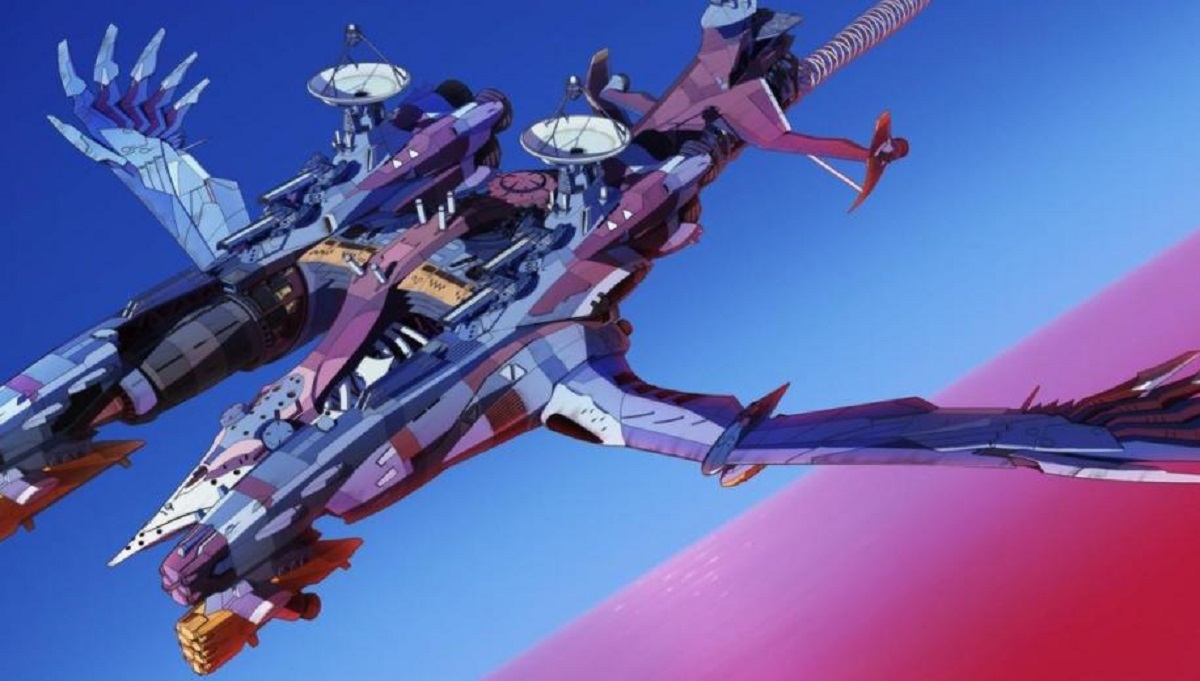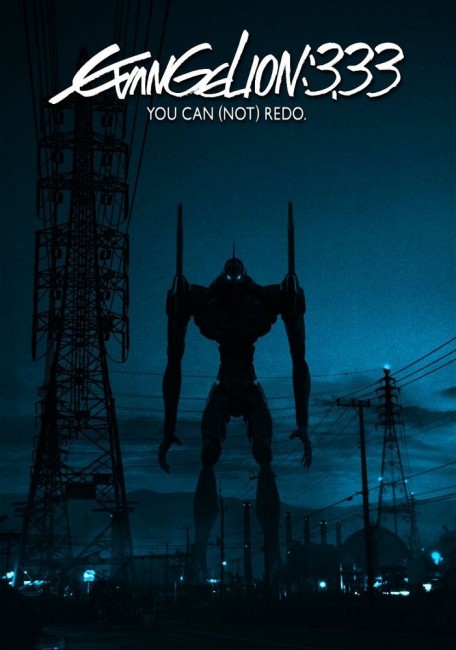aka Evangelion 3.0 Q (Quickening)
(Evangerion Shin Gekijoban: Kyu)
Crew
Chief Director/Screenplay – Hideaki Anno, Directors – Mahiro Maeda, Masayuki & Kazuya Tsurumaki, Photography – Toru Fukushi, Music – Shiro Sagisu, Chief Animation Director – Takeshi Honda, Art Direction – Hiroshi Kato & Tatsuya Kushida. Production Company – Studio Khara.
Plot
Shinji Ikari is revived to find that it is now fourteen years after the massive battle with the Angels. Brought around aboard the ship Wunder headed by the organisation WILLE, he is regarded as unstable and outfitted with an explosive necklace that will kill him if he attempts to pilot an EVA again. He is then rescued by an old style EVA piloted by Rei and taken to the ruins of the abandoned NERV underground headquarters. There he is befriended by Kaworu Nagisa who shows Shinji the true extent of what has happened – how the battle that he took part in brought about the Third Impact and obliterated much of the Earth. As Shinji tries to cope with this knowledge, Kaworu persuades him that there is hope to rebuild the world if they board an EVA together and retrieve the spears that killed the Angel Lilith.
Evangelion 3.0: You Can (Not) Redo was the third of the films spun off from the cult anime tv series Neon Genesis Evangelion (1995-6), which concerned a group of teenagers who have been recruited to pilot vast Mecha in a war against alien invaders. The series was successfully rebooted by its original creator Hideaki Anno in a big-screen anime outing Evangelion 1.0: You Are (Not) Alone (2007), which was followed by Evangelion 2.0: You Can (Not) Advance (2009) and You Can (Not) Redo and subsequent to this the fourth and final film Evangelion: 3.0+1.0 Thrice Upon a Time (2021).
I have a problem with these Evangelion reboot films. What I enjoy about them is the often stunning and beautiful animation and the epic-sized battles between mecha and alien machines. At the same time, the films are often confusing and hard to follow in terms of what is going on or where the characters are coming from. Certainly, by the time of Evangelion 2.0, you had the sense that the series was starting to get everything together.
Evangelion 3.0: You Can (Not) Redo starts off with familiar expectation. It opens on a sequence as the EVAs go into action in a gigantic struggle against alien machines in order to retrieve an object from orbit. This seems typical of the Evangelion films – epic-scaled action, strange alien objects and not a clue about what is happening. Not long after, we are reintroduced to the hero of the series who is now a prisoner aboard the ship Wunder and regarded as extremely dangerous. The Wunder is another of the bizarre vehicular creations that fill the series – sort of like a regular ocean-going navy vessel that transforms into a bird-shaped war machine with strange jutting gun emplacements and a metal corkscrew shaped tail nearly twice the length it is.

After the opening however, Evangelion 3.0: You Can (Not) Redo turns into a strange disappointment. Where all the other films were about epic-sized battles and confrontation with vast alien forces, this isn’t. Almost the entirety of the story is about reacting to the events that transpired in the last film ie. Shinji going through the anguish of the realisation that he brought about the Third Impact. By contrast to the other films, there is almost nothing in the way of the giant-sized action scenes – the bulk of the film features Shinji in the empty ruins of NERV headquarters trying to deal with emotions and guilt. This proves a considerable letdown, even in terms of the not always clear expectations that one has of the Evangelion films.
Certainly, there is considerable beauty to some of these images – a giant arena of ruined buildings, Shinji and Kaworu sitting amid the emptiness playing a duet on a grand piano – yet the film contains very little of the action we expect of it, just a couple of giant machine battles that are fairly low-key and unexceptional in comparison to the rest of the series. You can call Evangelion 3.0 a beautifully made disappointment.
Subsequent to this, director Hideaki Anno branched out into live-action with Shin Godzilla/Godzilla: Resurgence (2016), as well as wrote/produced the big-screen reboot of Shin Ultraman (2022) and directed/wrote the big-screen reboot of Shin Kamen Rider (2023).


